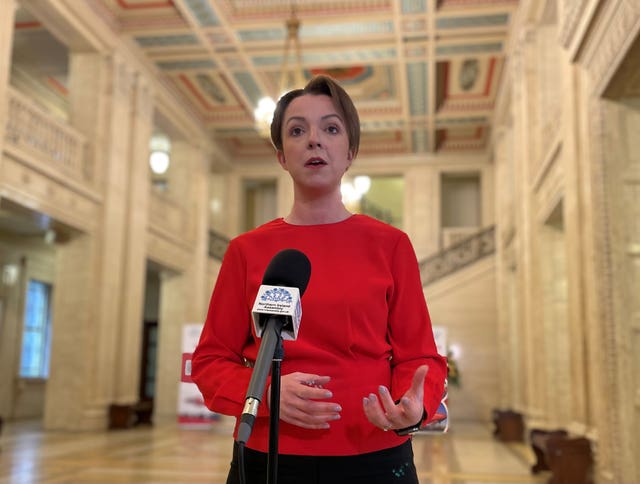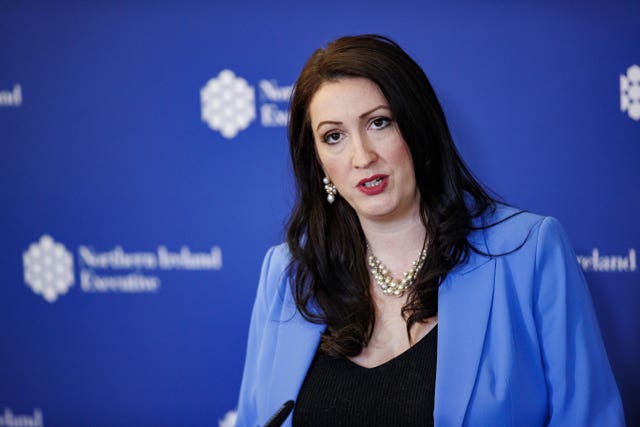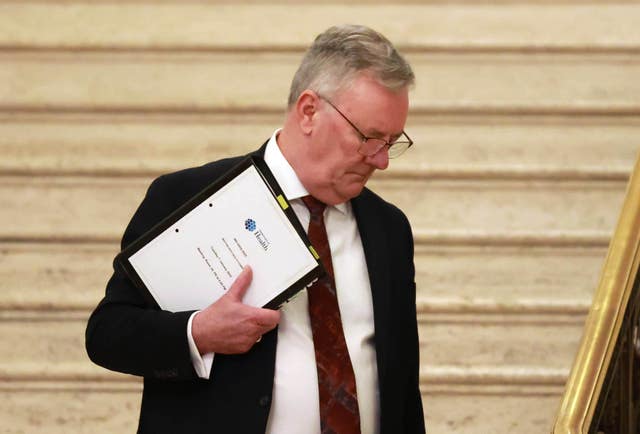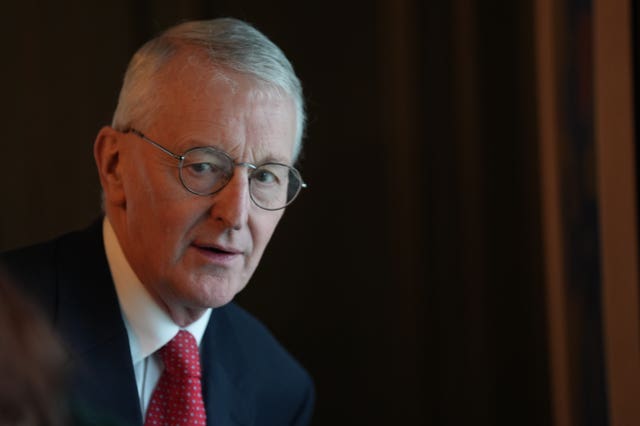Legal duty to bring Irish language signs decision to Executive – Little-Pengelly
Controversy has flared after Sinn Fein minister Liz Kimmins announced dual language signage will be installed at Belfast’s Grand Central Station.

A Stormont minister has a “legal duty” to bring a decision to erect Irish language signs at Belfast’s Grand Central Station to the Executive, deputy First Minister Emma Little-Pengelly has said.
Ms Little-Pengelly said the move by Stormont Infrastructure Minister Liz Kimmins did not “constitute value for money or good decision-making”.
Health Minister Mike Nesbitt said he was concerned about the cost of the replacement signage and said he wanted answers as to why the issue was not sorted during construction of the transport hub.
Meanwhile, Northern Ireland Secretary Hilary Benn said it was a matter for the relevant minister and the Executive but added that all languages and cultures should be respected.

Controversy has flared after Sinn Fein minister Ms Kimmins announced last week that the dual language signage will be installed at the transport hub in south Belfast which opened last year.
Unionists have raised concerns and DUP ministers have written to the Infrastructure Minister asking how the decision was made. They have also said they will bring up the row at Thursday’s Executive meeting.
The Department for Infrastructure said the decision was taken directly by Ms Kimmins, and not by Translink, the publicly funded transport operator which owns the £340 million station.
Under Stormont rules, ministerial decisions that are deemed significant or controversial should be considered collectively by the powersharing coalition, rather than by an individual minister.
However, within the Executive it is ultimately the responsibility of Sinn Fein First Minister Michelle O’Neill and DUP deputy First Minister Emma Little-Pengelly to jointly decide what issues are significant or controversial and should be subject to a wider vote.

Ms Little-Pengelly told the BBC Good Morning Ulster programme that her concern was the cost of replacing signs that are “virtually new”.
She added: “The minister appears to have announced over the course of the last week that she is going to pull those out and replace those at a cost to the taxpayer of £120,000.
“I think there is genuine concern. This is a legitimate question to ask, why on earth would we be doing this at this time?”
The deputy First Minister continued: “Any controversial or significant issue ought to be brought to the Executive. The minister has not done that so we have asked questions about what is the nature of this decision, we will be asking those questions as to why she has not brought that to the Executive.
“The key issue is to get that information and to ask the minister what she is doing.
“If it is an issue which is controversial or significant she has that legal duty under the legislation to bring that matter to the Executive.
“First of all it is about making that absolutely clear to the minister. The minister then has a decision to make about bringing that. That decision is not rightfully taken, it is not a decision that she can take alone, she would need to bring that to the Executive, that is the stage we are at.
“All controversial and significant matters have to be brought to the Executive for Executive agreement. That is the law. The minister should want to abide by the law.”
Ms Little-Pengelly added: “To be putting new signs into a building and then ripping them out a few months later to replace them on a particular agenda to me does not constitute value for money, it doesn’t constitute good decision-making.”

Ulster Unionist minister Mr Nesbitt said the cost of replacing the signage was an issue for him.
He said: “Could you imagine if I decided I wanted tri-lingual language on every building that delivered healthcare, whether it was hospitals, GP surgeries, social care venues?
“That would cost, I would imagine, tens and tens of millions of pounds while people are stuck on waiting lists for year after year.
“I am looking forward to discussing it with Executive colleagues on Thursday morning.”
He added: “One of the first questions I want to ask is why has this issue come to the fore so late in the day?
“Why did a previous minister not sort it out during the construction phase of Grand Central Station?”
Grand Central Station has been billed as the largest integrated transport hub on the island of Ireland, with services including trains between Belfast and Dublin.

When the station opened last year disappointment was expressed by the Irish language community that the signage did not incorporate Irish.
Speaking at Westminster, Mr Benn said: “That is a matter for the minister and the department in discussion with Translink, but look my view is we should celebrate and respect all languages and all traditions in Northern Ireland.”
“It’s a matter in the end for the Infrastructure department and the Executive to sort out.
“But I repeat, we should respect all the languages and all traditions, because that’s the way in which Northern Ireland will continue to progress.”





